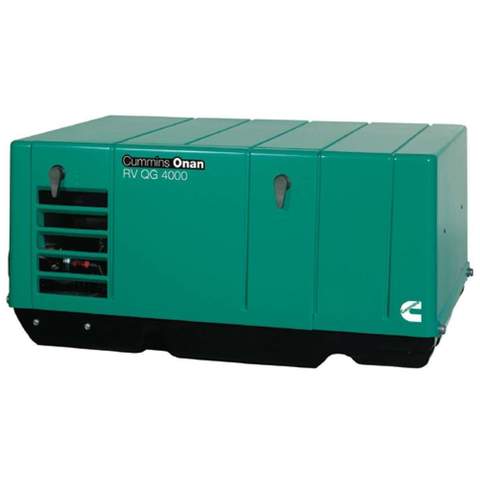This comes up online so often online that arguably its comparable to, “Cats or Dogs?”
But not really. Each has their own advantages and disadvantages, so its worth considering what you plan to do with it.
Its important to understand that RV diesel generators are not the same thing as the legendary commercial diesel generators that seem to last forever. A lot of folks think of that, but these are a breed apart.
Stationary diesel generators are slow turning 1800 rpm engines, cooled by water like your car. Some are even rated “prime”, as in, meant to run continuously!
RV diesel generators are not the same thing at all. They run at double the speed – the same speed as propane generators, which also turn at 3600 rpm, so they don’t have the same reliability as stationary diesel generators.
Does an RV diesel generator really last longer than a propane generator? Well, nobody really knows. The block is thicker and heavier, so maybe. I think the conventional wisdom though is that “costs per kw hour” may be about the same as propane though, because diesel is more expensive to make and more expensive to service. That’s my guess too, but not based on any scientific evidence.
So on total ownership costs per kilowatt-hour, possibly around the same.
Exhaust emissions – and the is the big one – are completely different. Propane generators are clean burning (relatively). (Well, as much as you can call any fossil fuel clean burning anyway)
Their exhaust is near odorless. It will still kill you if it leaks into the RV (carbon monoxide).
Diesel on the other hand, is absolutely horrendous. Its so hazardous that diesel autos were effectively banned for many years in the USA. Diesel is back now on autos and trucks, but with tens of thousands of dollars of pollution controls. There are no such regulations on diesel generators, so they spew hazardous and carcinogenic fumes.
Not only is diesel exhaust from a generator extremely harmful, but it has an obnoxious smell that can travel quite a way. I wouldn’t camp nearby one because of the health risks.
So why do lots of RVS have diesel generators, if they are so deadly? I dunno. I used to have a small horse farm and for years I had a diesel lawn mower and backhoe, and never thought a thing about it. Its all relative I guess. Now that I am 64 and facing maybe only another 20 years of life, I guess I am more risk averse.
Diesel generator fumes are far more offensive and noxious than propane.
Diesel is potentially more convenient if you already have a diesel RV. Propane is notoriously a pain to fill. Its harder to find and there is often a wait.
One thing to consider for sure is that most people with an RV don’t really use their generator very much if at all beyond the monthly required exercise cycle. And long term, generators may be fading from RV history as more people opt for a Lithium battery bank instead or even a propane fuel cell.
For my money, a propane generator is overwhelmingly the best choice today. It’s cheaper and healthier, and less obnoxious to nearby campers (and us).
Lithium battery banks are not really ready for prime time yet in my view. They have a lot less punch (Kwh) than generators, and require a massive solar farm to recharge in a short time. My small RV probably will never have enough roof space for that option.
Note that everybody’s camping is different. If you rarely if ever dry camp and just need a generator for that occasional event or to run the AC for 2 hours, a Lithium bank may be just fine. Again, many RV owners never use the generator anyway.
On the other hand if you are using your RV as a remote cabin for the summer diesel might be better (if you can stomach the stench) as you can truck in jerry cans of fuel with ease for refills.
So each option ultimately has their place. For us camping is about a peaceful stretch in some remote woods where we can small the fragrances of nature and so diesel is out of the question, a battery bank lacks enough punch, and the propane generator is just right for now.

Leave a Reply